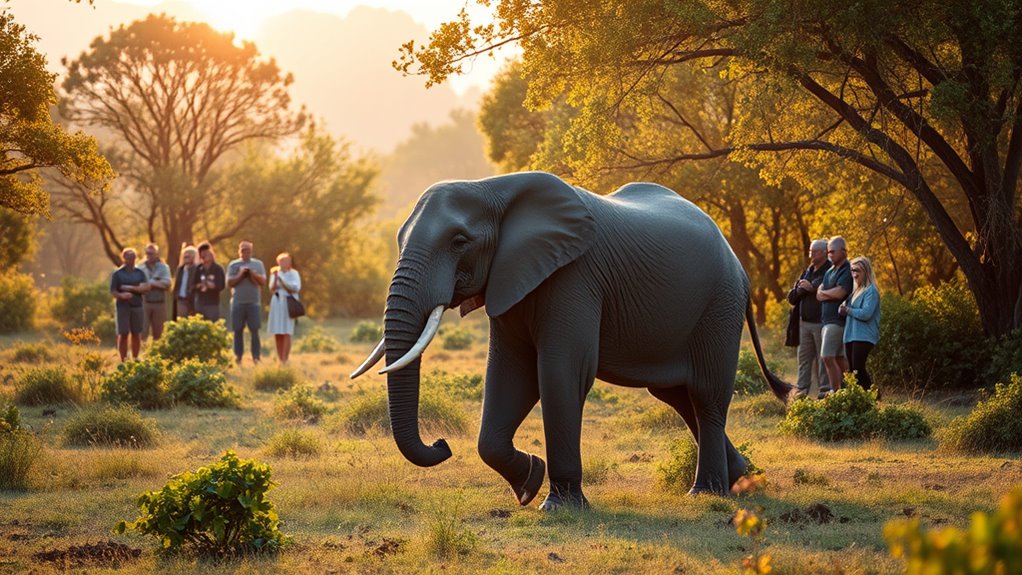When exploring wildlife tourism, make sure you respect animals and their habitats. Choose operators that prioritize ethical practices and animal welfare. Keep a safe distance, observe quietly, and avoid disrupting their natural behavior. Always opt for eco-friendly travel options and support local communities to create a positive impact. By making conscious choices, you contribute to conservation efforts and help preserve ecosystems. There’s much more to uncover about ethical wildlife tourism and how you can make a difference.
Key Takeaways
- Choose wildlife tour operators committed to ethical practices and animal welfare, avoiding those that exploit or harm wildlife.
- Observe wildlife from a respectful distance using binoculars or zoom lenses to minimize stress on animals.
- Opt for eco-friendly travel options, reducing your carbon footprint and supporting sustainable tourism practices.
- Engage with local communities to ensure they benefit economically from tourism and promote conservation efforts.
- Prioritize memorable experiences rooted in respect for nature, contributing positively to wildlife and habitat conservation.

As you explore the world of wildlife tourism, it’s crucial to contemplate the ethical implications of your choices. Every decision you make can impact not only your experience but also the well-being of the animals and the ecosystems you’re visiting. While the thrill of seeing majestic creatures in their natural habitat is exhilarating, you need to consider how your presence affects them.
When planning your trip, seek out operators committed to ethical practices. These companies prioritize animal welfare and conservation, ensuring that your visit doesn’t exploit or harm wildlife. Take the time to research tour guides and organizations. Look for certifications from credible wildlife conservation groups, as these often indicate adherence to ethical standards. Avoid attractions that promote animal shows or direct interactions, as these often involve stressful conditions for the animals involved.
Your behavior while observing wildlife matters just as much as the company you choose. Maintain a respectful distance to minimize stress on the animals. Use binoculars or a camera with a zoom lens to capture memories without intruding on their space. Remember, the goal isn’t just to see the animals but to appreciate them in their natural environment. Loud noises, sudden movements, or attempts to feed them can lead to negative consequences for both you and the wildlife.
Respectful observation is key; maintain distance and use zoom lenses to appreciate wildlife in their natural habitat without causing stress.
Additionally, think about the environmental impact of your travel choices. Opt for eco-friendly accommodations and transportation that minimize your carbon footprint. Travel during off-peak seasons to reduce pressure on fragile ecosystems. By choosing less popular times, you help distribute the tourist load, allowing wildlife and habitats to recover from human impact.
It’s also essential to support local communities. Engaging with indigenous cultures enhances your experience and contributes to the local economy. By purchasing crafts or participating in community-led tours, you help ensure that local people benefit from wildlife tourism. This, in turn, encourages them to protect their natural environment and the creatures that inhabit it.
Ultimately, your wildlife tourism experience should leave you with memories of awe and respect for nature. By making ethical choices, you not only enhance your journey but also contribute to the conservation of wildlife and their habitats. As you plan your next adventure, keep these principles in mind, and you’ll help ensure that wildlife tourism benefits everyone involved—especially the animals.
Frequently Asked Questions
How Can I Identify Ethical Wildlife Tourism Operators?
To identify ethical wildlife tourism operators, start by researching their practices and policies. Look for operators that prioritize animal welfare, promote conservation, and avoid exploitative activities. Check reviews and testimonials from previous travelers, and verify they’re transparent about their operations. Look for certifications from reputable organizations. When you inquire, ask specific questions about their treatment of animals and conservation efforts. If they’re hesitant to answer, consider it a red flag.
What Are Some Red Flags for Unethical Wildlife Experiences?
Some red flags for unethical wildlife experiences include operators that allow direct contact with animals, like petting or riding. If you see animals in small, dirty enclosures or being forced to perform tricks, it’s a warning sign. Also, if guides aren’t knowledgeable about the animals or their habitats, that’s concerning. Ultimately, if the operator doesn’t prioritize conservation or education, you should reconsider your choice and seek alternatives that respect wildlife.
Are There Certifications for Ethical Wildlife Tourism?
You won’t believe the number of certifications out there for ethical wildlife tourism! Organizations like the Global Sustainable Tourism Council and the Wildlife Conservation Society offer certifications that guarantee responsible practices. When you’re planning your adventure, look for these badges of honor—it’s your ticket to supporting wildlife-friendly experiences! Trust me, spotting that certification will make you feel like a superhero for animals, ensuring your trip leaves a positive impact on their world.
How Do I Report Unethical Wildlife Tourism Practices?
To report unethical wildlife tourism practices, start by gathering evidence like photos or videos of the activities in question. Contact local wildlife authorities or animal welfare organizations, providing them with detailed information. You can also report to the tourism board or relevant regulatory bodies in the region. If applicable, share your concerns on social media to raise awareness. Remember, your voice can help drive change for better treatment of animals in tourism.
Can Wildlife Tourism Negatively Impact Local Communities?
Wildlife tourism can wreak havoc on local communities. When hordes of tourists flood in, they often drive up prices, disrupt local cultures, and strain resources. You might see locals struggling to compete for jobs or facing environmental degradation as businesses cater to visitors. While it can bring some economic benefits, the negative impacts can overshadow them, leaving communities grappling with challenges that overshadow their traditional ways of life.
Conclusion
As you set out on your wildlife adventures, remember that ethical tourism is about more than just observing animals; it’s about respecting their natural habitats and well-being. By choosing responsible tours and minimizing your impact, you contribute to the preservation of these magnificent creatures. Isn’t it our responsibility to ensure future generations can marvel at wildlife just as we do? Let’s prioritize compassion and conservation, making every trip a chance to protect the planet’s incredible biodiversity.









